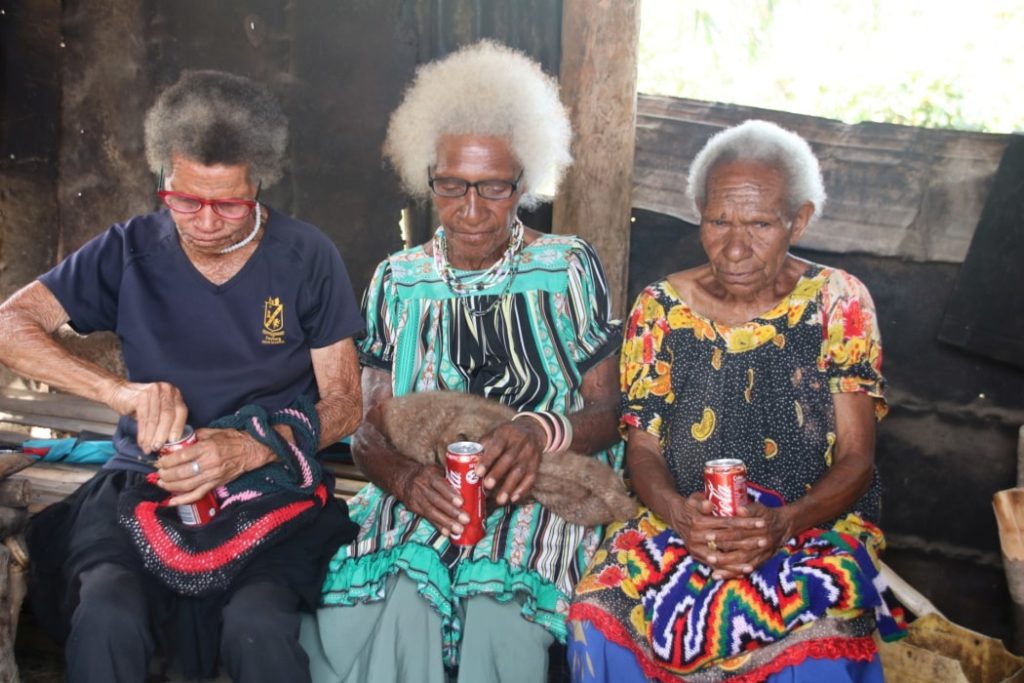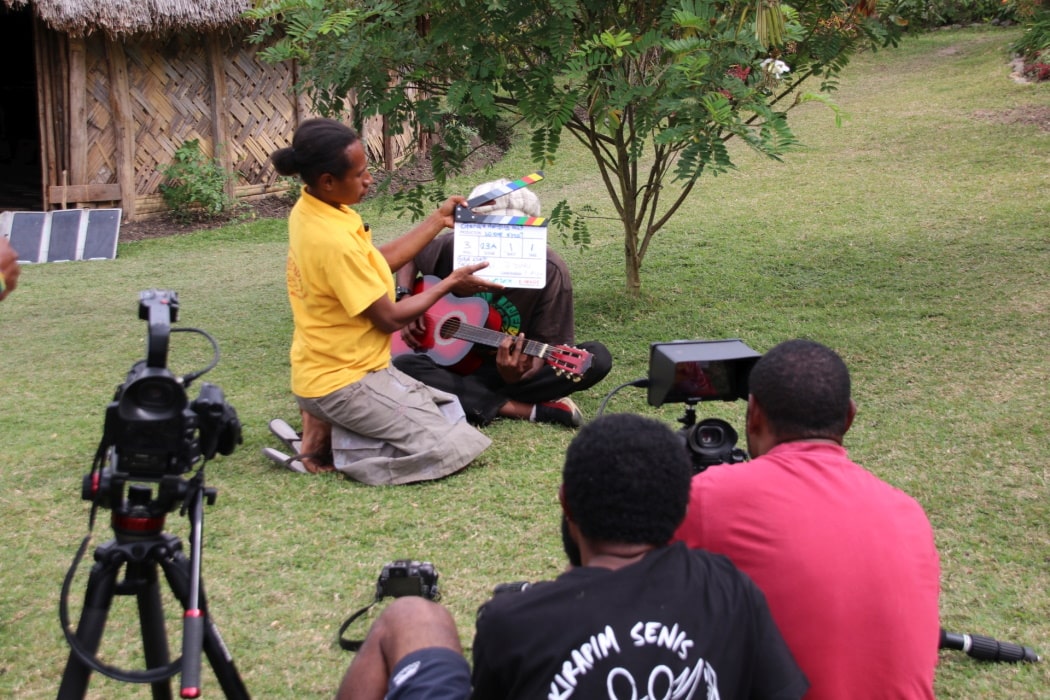On June the 2nd, the Ethnological Museum of the National Museums in Berlin, the Humboldt Forum Foundation in the Berlin Palace and the German International Film Festival (GIEFF) are organising a film day dedicated to ethnographic film. Under the title Slices of Life, a total of seven cinematic works from four continents will be presented. The thematic complexes of cooperation and perspectives form the common thread between the otherwise highly diverse productions.
Image above: Footage from the shooting of the pilot episode of the telenovela “A Slice of Life – Opena Gosalo”, © Yumi Piksa
Mali, Cameroon, India, Brazil, the USA and Papua New Guinea – these are the countries in which the seven ethnographic films presented as part of the Slices of Life film day at the Humboldt Forum were made. What they have in common is a cooperative creative process of people in front of and behind the camera that systematically breaks down the strict separation between filmmakers and filmed. Transparent decision-making structures and common goals of the participants are at the forefront of all the film projects shown.
After each of the five film blocks, the complexity of the relationships between filmmakers and the people filmed will be discussed in a subsequent talk with the participants.
The Film Day will be moderated by freelance filmmaker, curator and journalist Dorothee Wenner. She works on the selection committee of the International Forum of Young Film and as the Berlinale Special Representative for India/Sub-Saharan Africa.
All films are shown in the original languages (Bambara, French, Hindi, Portuguese, Tok Pisin) with English subtitles.
The film day Slices of Life is a cooperation between the Ethnological Museum of the National Museums in Berlin, the Humboldt Forum Foundation in the Berlin Palace and the German International Film Festival (GIEFF).

Programme schedule:
11:00 am
Welcome: Gina Knapp (Curator of Visual Anthropology, Ethnological Museum – National Museums in Berlin)
11:10 – 12:50 am
Film: A Kali Temple Inside Out (83′) – India
A Kali Temple Inside Out shows everyday life in and around a Kali temple in the city of Kanpur in the Indian state of Uttar Pradesh. The focus is on a priest and three devotees in whose lives the temple plays a prominent role. Nevertheless, they occasionally visit sacred sites of other religious traditions, either to learn or to seek additional divine assistance. A Kali Temple Inside Out is thus also a silent critique of the sometimes obsessive religious conflicts of the global present.
Followed by a film discussion with Dipesh Kharel & Frode Storaas: Inside and Outside. Perspectives in the making of the film A Kali Temple Inside Out
1:00 – 2:45 pm
Film: Family Song (75′) – Brazil
A family decides to open a classical music school in their own home. The six young brothers begin to teach the children in their neighbourhood about different musical instruments. Little by little, the house becomes a musical meeting place in one of the most dangerous areas of the Brazilian metropolis of Fortaleza. But to realise their dream, the family has to seek new horizons. How far will music take them?
Followed by a film discussion with Mihai Andrei Leaha & Paula Bessa Braz: Filming (in) times of crisis: reflecting upon visual politics and collaboration against controllin images in Brazil
4:00 – 5:30 pm
Film: New York, Just Another City (18’30”) – USA
Indigenous director Patrícia Ferreira was awarded for her documentaries about and with her people – the Guarani Mbya, who are indigenous to the border region of Argentina, Paraguay, Uruguay and Brazil. Ferreira was invited to discuss her work at one of the largest ethnographic film festivals in the world, the Margaret Mead Film Festival at the American Museum of Natural History in New York. There she encounters exhibitions, debates and attitudes that make her think about the world of the Juruá people, which she contrasts with the Guarani way of life.
Film: Ãjãí: the Headball Game of the Myky and Manoki (48’) – Brazil
Ãjãí is a fun game where only the players’ heads are allowed to touch the ball. This custom, practised by only a few indigenous peoples in the world, is common among the Myky and Manoki people in the Brazilian state of Mato Grosso, who speak a language from an isolated language family. Young people of the Myky people decide to film their game for the first time to make it known outside the villages.
Followed by a film discussion with Typui Myky & André Lopes: Collaborative Films in Indigenous Terms I
6:00 – 7:30 pm
Film: Everyday Survival (39′) – Cameroon
Ecological destruction is increasingly threatening the livelihood of Musgum, a Cameroonian fisherman, and his family of around 50 people due to the scarcity of natural resources. Everyday Survival tells of the daily struggle and the strategies the family uses to successfully defy the odds.
Film: Kɔtɛ (26′) – Mali
The short film provides insights into the initiation ceremony of the kɔtɛ, which is widespread in the landlocked West African country of Mali. It takes place either after the death of a village chief or every seven years. During the two-day celebrations, the different stages of initiation are each symbolised by a battle in which two actors with opposite functions face each other.
Followed by a film discussion with Mouazamou Ahmadou & Sidylamine Bagayoko: The Viscam project
8:00 – 9:45 pm
Film: A Slice of Life (42′) – Papua New Guinea
A Slice of Life – Opena Gosalo is the pilot of the Papua New Guinea telenovela of the same name. It is set in Lopatena, a community of subsistence farmers and warriors in the island’s eastern highlands. A Slice of Life combines fictional drama with twenty-five years of ethnographic footage and is based on true events. The script was developed on location by the filmmakers, anthropologists and community members, who also act as actors in the film.
Followed by a film discussion withGina Knapp, Verena Thomas, Jackie Kauli, Karufe Kotile, David Papua’e, Daisy Samuel: Collaborative Films in Indigenous Terms II
WHEN?
Thursday, 2. June 2022, 11:00 am – 9:45 pm
WHERE?
Humboldt Forum, Ethnologisches Museum
Schlossplatz
10178 Berlin-Mitte






